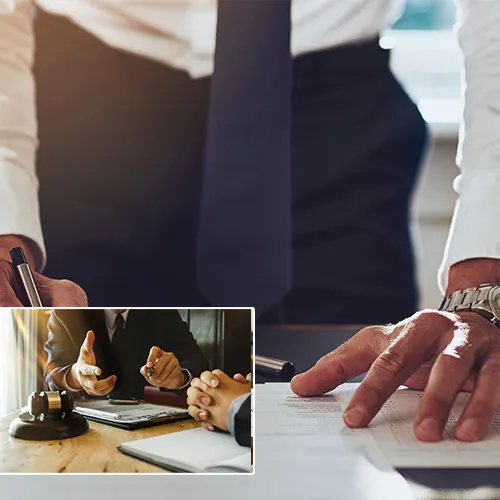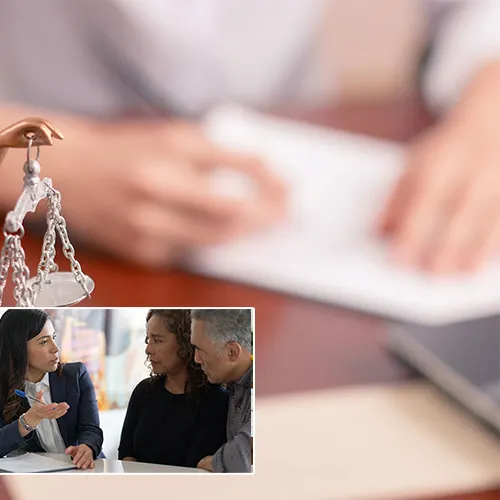Guide to Recording DUI Traffic Stops: Tips and Legal Rights
Table of Contents []
Recording DUI Traffic Stops
Welcome to Crouch Bartlett Law: Your Guide to Recording DUI Traffic Stops

Imagine you're driving home from a friend's place when you see those familiar flashing lights in your rearview mirror. Your heart skips a beat. Whether it's a routine check or a DUI suspicion, knowing your rights during a traffic stop is crucial. This is where recording the encounter can be a game-changer. At Crouch Bartlett Law, we champion your rights and champion the safekeeping of evidence. We believe that knowledge is power, and we're here to provide you with invaluable advice on navigating and recording DUI traffic stops.
Our expertise is not just theoretical; we live and breathe the legal nuances that can protect you. Our team is a phone call away from assisting you with answers or to book an appointment. Feel free to reach out at (512) 965-2449 anytime.
Understanding Your Rights
Before diving into recording practices, let's first unwrap the essential rights you have. Everyone has constitutional protections during police encounters, and it's important to keep them in the forefront of your mind.
Did you know that your First Amendment right allows you to record public officials, including police officers, in the performance of their duties? However, it is also vital to be aware of your state's specific eavesdropping laws. If you're unsure about the dos and don'ts, that's what we're here for.
The Legality of Recordings
When you decide to record a DUI traffic stop, understand that you must do so in plain sight. Secretive recording can lead you into legal hot water. Also, you cannot interfere with the officer's duties while recording; doing so could lead to additional charges.
It's about striking the right balance between your rights and legal compliance. Remember, the audio from recordings can be as significant as the videos themselves. Let us guide you in ensuring that everything is buttoned up legally.
Best Practices for Recording
To ensure that your recordings stand up in court, you need to follow some best practices. Always announce that you are recording. This not only puts everyone on their best behavior but also solidifies the legality of your actions.
Make sure your device is charged and has enough storage. The last thing you want is for the recording to cut out at a crucial moment. Need a checklist or further advice? Reach out to our knowledgeable staff at (512) 965-2449.
Utilizing Recordings Effectively
Simply having a recording isn't enough; you need to know what to do with it. That's where our legal professionals come in. They know the stakes and can use your recordings to your advantage, ensuring due process and fairness.
If you ever find yourself in a bind after a traffic stop, remember that these recordings can be the evidence that tilts the scales of justice in your favor.
Crouch Bartlett Law's Roadmap for Recording Traffic Stops Responsibly

When to Start Recording
Timing is everything. Begin recording as soon as you realize you're being stopped. This captures the initial interaction and any instructions or questions the officer may give. Have your camera ready; forethought can make all the difference.
Precise timing and a complete narrative are crucial. It can shed light on the situation leading up to the stop and the officer's conduct throughout the process. If this feels overwhelming, don't worry we are here to walk you through every step.
Technological Tips
Invest in a dashcam if you can. This offers a constant and unbiased perspective of your driving and encounters with law enforcement. Smartphones are handy, but they don't always tell the whole story.
Always back up your recordings in a secure place. Cloud storage or an external hard drive can prevent loss of precious evidence due to device malfunctions or other mishaps. Need to know more about the right tech to use? Your friends at Crouch Bartlett Law are just a call away: (512) 965-2449.
Interacting with Law Enforcement
Always be polite and respectful with officers. Your goal is not to invite conflict but to create a clear record of the incident. Affirm your rights calmly and comply with lawful orders while maintaining the recording.
Not sure how to balance compliance with rights assertion? That's a delicate dance that we specialize in. Remember, a recording can safeguard your rights but so can the proper demeanor and dialogue during a stop.
After the Stop: Next Steps
If you're cited or arrested, the journey doesn't end there. Retain all documentation and contact us promptly. Our legal experts can analyze the footage and provide you with the right course of action.
We pride ourselves on offering a beacon of guidance through murky legal waters. Ensuring that you come out of a DUI traffic stop with your rights intact and justice on your side is what drives our mission.
Empowering Yourself with Knowledge: Crouch Bartlett Law on Proactive Measures

Know Your State's Laws
Each state can have its twist on recording laws. Being savvy about your jurisdiction's rules is like having a shield in your arsenal. A good defense is rooted in knowing the intricacies before you even hit the road.
If specific state laws are a maze to you, don't stress. At Crouch Bartlett Law, we're seasoned navigators of legal labyrinths and ready to guide you.
Preparation Checklist
Before you get behind the wheel, consider this checklist:
- Do you have a recording device set up?
- Is your phone or dashcam charged and ready?
- Have you reviewed how to start recording quickly?
- Do you know your rights in a traffic stop scenario?
These questions can make the difference between being prepared and being caught off guard. And if you're unsure about any of these points, our experts are here to fill in the gaps for you.
Document Everything
From the moment the lights flash behind you, document what's happening. Take notes on the time of the stop, the location, and anything specific you notice. This can support your recording and offer a fuller picture of the event.
Your memories are important, but hard evidence often speaks louder. Keeping detailed records alongside your recording is a best practice that can pay off later. Still have queries? Our lines are always open: (512) 965-2449.
Connecting with Crouch Bartlett Law: Here When You Need Us Most

Access to Legal Experts
Should you need to escalate your traffic stop experience to a legal battle, rest assured that we have your back. Our legal experts are well-versed in leveraging recordings to uphold justice and ensure your rights are recognized and respected.
With a keen eye for detail and a deep understanding of the law, they'll work tirelessly on your behalf. Need legal firepower? Just dial in and speak with our team.
Comprehensive Support
From educational resources to one-on-one consultations, we provide a full spectrum of assistance designed to empower and protect you. Whether it's understanding your rights or navigating the aftermath of a traffic stop, we're your partners every step of the way.
We don't just offer advice; we offer a commitment to your peace of mind. For comprehensive support, reach out to Crouch Bartlett Law today.
Easy Connection and Booking
Making the connection should be the least of your worries. Whether you're reaching out with questions or you need to schedule an appointment, our lines are open and our staff is eager to assist. Just a phone call can put you on the path to clarity and resolution.
Don't hesitate-if you're grappling with concerns about recording DUI traffic stops, our knowledgeable team is ready to welcome your inquiries. Connect with us at (512) 965-2449.
Final Thoughts and Call to Action
Armed with the right information and support, you can confidently manage and record a DUI traffic stop. At Crouch Bartlett Law, our guidance is powered by dedication to your rights and legal protection. Remember, in moments of uncertainty, knowledge is your strongest ally, and we are here to provide that in abundance.
If you're ever in doubt, or just need some reassurance, our door is forever open to you. For unparalleled advice and connections to legal professionals adept in using recording evidence effectively, make the call to (512) 965-2449 today.
Previous Page